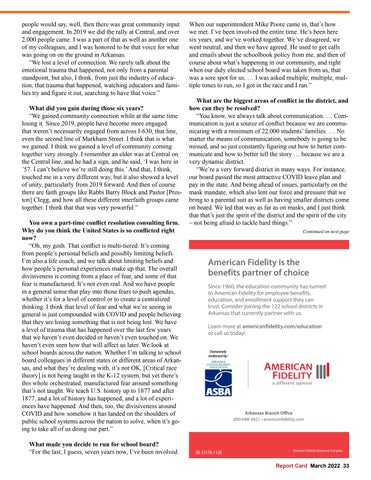people would say, well, then there was great community input and engagement. In 2019 we did the rally at Central, and over 2,000 people came. I was a part of that as well as another one of my colleagues, and I was honored to be that voice for what was going on on the ground in Arkansas. “We lost a level of connection. We rarely talk about the emotional trauma that happened, not only from a parental standpoint, but also, I think, from just the industry of education, that trauma that happened, watching educators and families try and figure it out, searching to have that voice.” What did you gain during those six years? “We gained community connection while at the same time losing it. Since 2019, people have become more engaged that weren’t necessarily engaged from across I-630, that line, even the second line of Markham Street. I think that is what we gained. I think we gained a level of community coming together very strongly. I remember an elder was at Central on the Central line, and he had a sign, and he said, ‘I was here in ’57. I can’t believe we’re still doing this.’ And that, I think, touched me in a very different way, but it also showed a level of unity, particularly from 2019 forward. And then of course there are faith groups like Rabbi Barry Block and Pastor [Preston] Clegg, and how all these different interfaith groups came together. I think that that was very powerful.” You own a part-time conflict resolution consulting firm. Why do you think the United States is so conflicted right now? “Oh, my gosh. That conflict is multi-tiered. It’s coming from people’s personal beliefs and possibly limiting beliefs. I’m also a life coach, and we talk about limiting beliefs and how people’s personal experiences make up that. The overall divisiveness is coming from a place of fear, and some of that fear is manufactured. It’s not even real. And we have people in a general sense that play into those fears to push agendas, whether it’s for a level of control or to create a centralized thinking. I think that level of fear and what we’re seeing in general is just compounded with COVID and people believing that they are losing something that is not being lost. We have a level of trauma that has happened over the last few years that we haven’t even decided or haven’t even touched on. We haven’t even seen how that will affect us later. We look at school boards across the nation. Whether I’m talking to school board colleagues in different states or different areas of Arkansas, and what they’re dealing with, it’s not OK. [Critical race theory] is not being taught in the K-12 system, but yet there’s this whole orchestrated, manufactured fear around something that’s not taught. We teach U.S. history up to 1877 and after 1877, and a lot of history has happened, and a lot of experiences have happened. And then, too, the divisiveness around COVID and how somehow it has landed on the shoulders of public school systems across the nation to solve, when it’s going to take all of us doing our part.” What made you decide to run for school board? “For the last, I guess, seven years now, I’ve been involved.
When our superintendent Mike Poore came in, that’s how we met. I’ve been involved the entire time. He’s been here six years, and we’ve worked together. We’ve disagreed, we went neutral, and then we have agreed. He used to get calls and emails about the schoolbook policy from me, and then of course about what’s happening in our community, and right when our duly elected school board was taken from us, that was a sore spot for us. … I was asked multiple, multiple, multiple times to run, so I got in the race and I ran.” What are the biggest areas of conflict in the district, and how can they be resolved? “You know, we always talk about communication. … Communication is just a source of conflict because we are communicating with a minimum of 22,000 students’ families. … No matter the means of communication, somebody is going to be missed, and so just constantly figuring out how to better communicate and how to better tell the story … because we are a very dynamic district. “We’re a very forward district in many ways. For instance, our board passed the most attractive COVID leave plan and pay in the state. And being ahead of issues, particularly on the mask mandate, which also lent our force and pressure that we bring to a parental suit as well as having smaller districts come on board. We led that way as far as on masks, and I just think that that’s just the spirit of the district and the spirit of the city – not being afraid to tackle hard things.” Continued on next page
American Fidelity is the benefits partner of choice Since 1960, the education community has turned to American Fidelity for employee benefits, education, and enrollment support they can trust. Consider joining the 122 school districts in Arkansas that currently partner with us. Learn more at americanfidelity.com/education or call us today! Exclusively endorsed by:
Arkansas Branch Office 800-688-4421 • americanfidelity.com
SB-33178-1120
American Fidelity Assurance Company
Report Card March 2022 33

















